Juni Learning is an online tutoring platform offering 1:1 STEM and enrichment classes to K-12 students. It competes with other virtual tutoring and homework-help services by using young tutors from top U.S. universities. This article examines Juni Learning’s user reviews, pricing, and offerings in 2025, helping students and parents evaluate the service and compare it to alternatives.
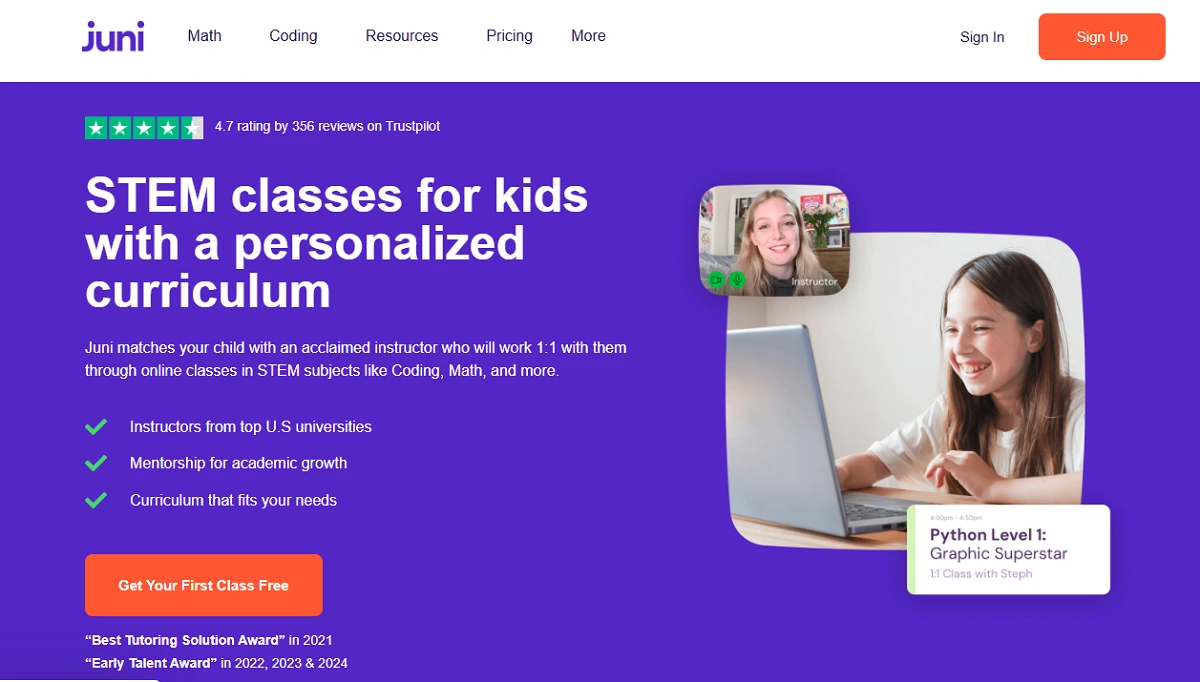
Juni Learning Reviews and Testimonials
Juni Learning has generally positive feedback online. For example, its website highlights a 4.6/5 Trustpilot rating (over 356 reviews), and third-party analysis notes an average of about 4.8/5 across Trustpilot and other review sites. Parents frequently praise the personalized attention and progress tracking. One testimonial on Juni’s site notes, “our children still love coding at Juni, especially the very personal attention from both the instructors and support team”. Another parent emphasizes Juni’s skilled, relatable instructors and supportive community. Even on Reddit, a parent wrote: “We enrolled our kid in the coding classes at Juni. Their customer support team helped us decide which course was best for our kid, which was great”.
The consensus from user reviews is mostly positive. Parents mention that children look forward to their classes and feel accomplished. They like the clear session notes and the regular reports that show each child’s progress. Students describe the lessons as engaging and well-paced. For example, one student said the self-paced approach lets them move quickly through familiar material and then focus on new challenges.
Negative comments are relatively rare but tend to focus on logistics. A few users mentioned scheduling issues or missed expectations (for example, difficulty rescheduling or cases where a child didn’t learn as much as hoped). By far, however, most reviews do not raise serious concerns. Overall the high ratings and positive endorsements suggest Juni Learning is a legitimate and effective tutoring platform. One review bluntly states: “Yes, Juni Learning is a legit 1:1 online class platform” and notes its high Trustpilot score (around 4.8/5). In summary, Juni Learning comes across as a reputable service with many satisfied students and parents.
Is Juni Learning legit? Based on hundreds of reviews and the company’s track record, Juni appears to be a genuine service. It has been featured in publications like TechCrunch and is backed by credible investors. Its tutors are carefully screened and the platform is well-established, so it can be considered a legitimate tutoring option in 2025.
Juni Learning Pricing
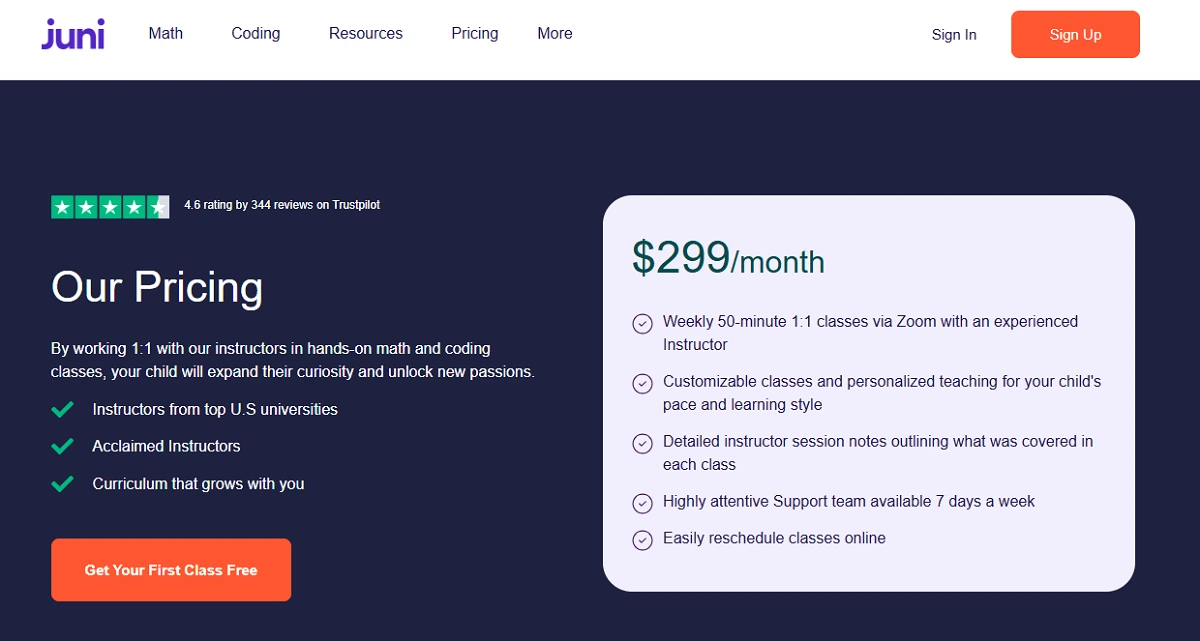
Pricing Range
Juni’s pricing is subscription-based. Their core plan is roughly $299 per month for four weekly 50-minute classes (100 minutes total per month). Reviews indicate a tiered structure costing about $140 to $450 per month, depending on how many sessions and extras are included. In other words, a basic four-session plan is about $299/mo, and adding more classes or subjects raises the price. All fees are in U.S. dollars and billed monthly. Juni’s pricing page outlines this structure and what is included in each plan.
What Students Say About Juni Learning Pricing
Parents generally view Juni Learning as a premium service. Many do not object to the cost because it covers a full curriculum and personal tutoring. Some note that compared to paying by the hour, it may be a good value: for example, $299 for four classes works out to roughly $75 per class, which is in line with or below some private tutor rates. For context, independent tutors on platforms like Wyzant charge on average $35–$60 per hour, so Juni’s bundled price (about $75 per 50-minute class) is within that range. Few reviewers complain specifically about cost, suggesting parents generally feel the quality justifies the price. However, some mention that Juni is more expensive than drop-in help services. In summary, Juni’s rates are on the higher end of the tutoring market, reflecting its curated approach, and students expect to pay around a few hundred dollars per month for regular instructions.
Hidden Costs
Juni’s pricing is transparent in that the monthly fee covers the scheduled classes and curriculum. There are no obvious hidden fees. According to the pricing details, each plan includes all class time, session notes, progress reports, and tutor support. Juni does not charge extra for materials or administrative fees beyond the monthly subscription. One factor to note: If you book additional drop-in sessions beyond your plan, those may cost extra (but standard tutoring is all-inclusive in the monthly cost). Apart from optional add-ons (like certain one-off workshops), there are no surprises – the monthly price is the total tuition fee for the classes you sign up for.
How Juni Learning’s Pricing Works
Juni operates on a recurring monthly subscription model. When you sign up, you choose a plan and pay in advance for that month’s classes. You can usually adjust your plan or number of classes at the end of each month. Classes do not roll over: if you miss a scheduled class without timely notice, you will still be charged for that session. Juni’s policy is that classes must be paid upfront, and cancellations or make-up classes are governed by their terms (no prorated refunds for unused days). In effect, you prepay for your block of classes each month. Upgrades (more classes) are added at the start of a month, while downgrades or cancellations must be done a few days before the next billing date to avoid charges. This model incentivizes regular attendance of the prepaid sessions.
Free Trial
Juni Learning offers a trial period for new students. Specifically, they provide a 2-week free trial to let families experience the service before committing. During this trial, students can attend trial classes and see how the tutoring works. According to Juni’s website and reviews, this trial allows parents to assess a tutor and curriculum at no cost. To start, you can sign up for the free trial through Juni’s site (for example, by booking a free placement class on their dashboard). This trial makes it easier for students and parents to evaluate Juni without upfront payment.
Refund Policy
Juni’s refund policy is strict. As stated in their Terms of Use, monthly subscriptions are non-refundable and not prorated. You may cancel anytime, but you will not receive money back for the remaining days in a month. In practice, this means you must be confident in your plan before paying each month. Juni does allow you to cancel at any time (with at least 3 business days’ notice before the next billing date to avoid the next charge), but if you cancel mid-cycle there is no refund for that portion of the month. Some users have noted the policy’s transparency: lack of partial refunds is clearly disclosed, so it’s not a hidden fee but a firm term of service. Juni does offer refunds in limited cases (for example, their AceIt test-prep product has a separate guarantee), but for regular tutoring no cash refunds are given once the month begins. A few online forum posts indicate this is a point of complaint if someone needs to withdraw mid-month, but overall most families plan with the monthly schedule in mind.
Juni Learning Alternatives
Parents and students may look at other tutoring options for comparison. Below are some popular alternatives to Juni Learning:
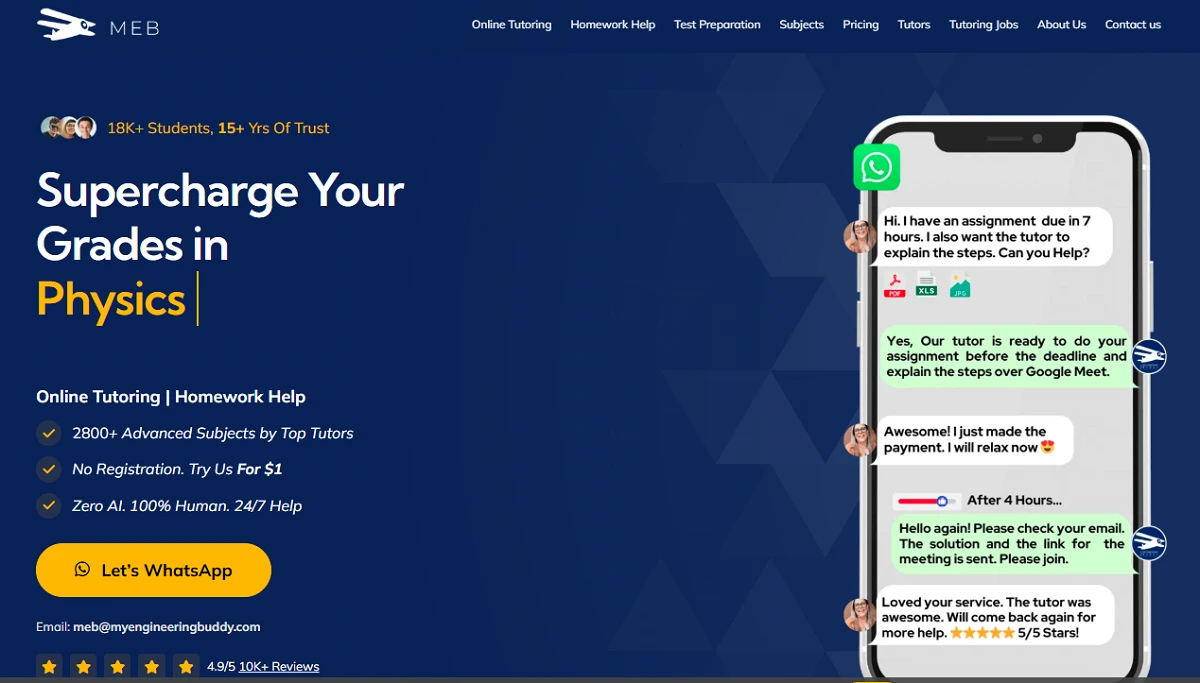
- My Engineering Buddy: This service focuses on college-level engineering and technical subjects, offering on-demand help. It tends to be less expensive than Juni; users report that MEB often charges “about half” the cost of local alternatives. Unlike Juni’s structured classes, MEB connects students to tutors via WhatsApp or email for one-off assignment help. This makes it ideal for complex homework or project assistance. Tutors at MEB are typically practicing engineers, so they may excel in specialized college subjects that Juni doesn’t cover. However, the user experience is less platform-based and more informal (some reviews call the WhatsApp setup “clunky”). In summary, MEB offers more flexible, task-based help (especially in engineering topics) at lower cost, whereas Juni provides a formal curriculum and regular schedule for K-12 STEM.
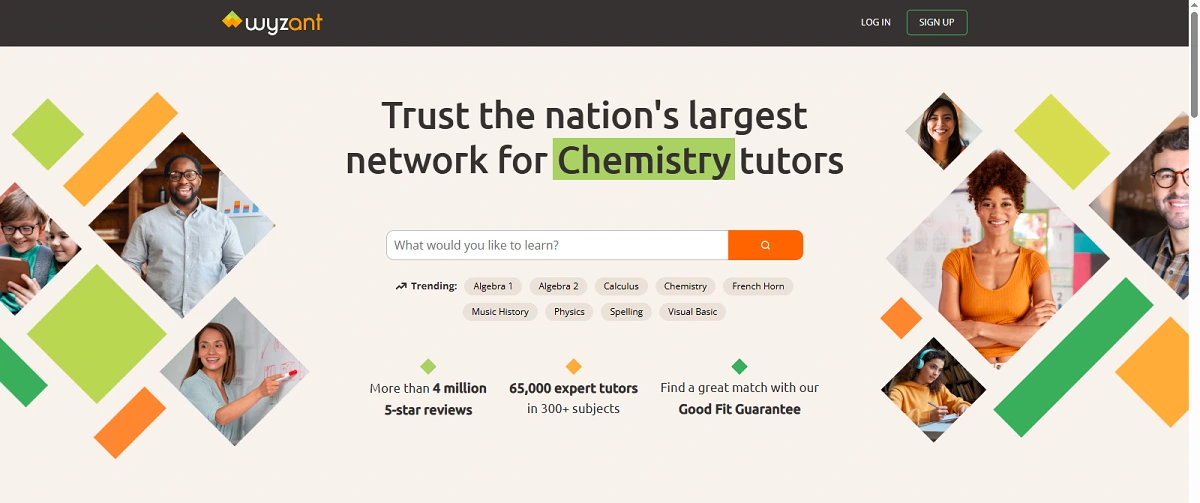
- Wyzant: Wyzant is a large marketplace of independent tutors in many subjects. Tutors set their own hourly rates (typically $35–$60/hr on average, but ranging from ~$10 to well over $100) and keep roughly 75% of their fee. Students can browse tutor profiles, read reviews, and book sessions one-on-one. Unlike Juni, Wyzant does not use a subscription; you pay per class. The quality of tutors varies widely, since anyone can join (tutors range from certified teachers to college students). Scheduling is on-demand rather than a fixed monthly plan. Wyzant’s ease of use is straightforward (search and book through their app), but consistency depends on finding the right tutor. Juni, by contrast, vetts instructors and sets the curriculum, so parents may trust Juni’s consistency more. Wyzant is better for flexible, drop-in help in specific subjects, while Juni is designed for ongoing curriculum support.
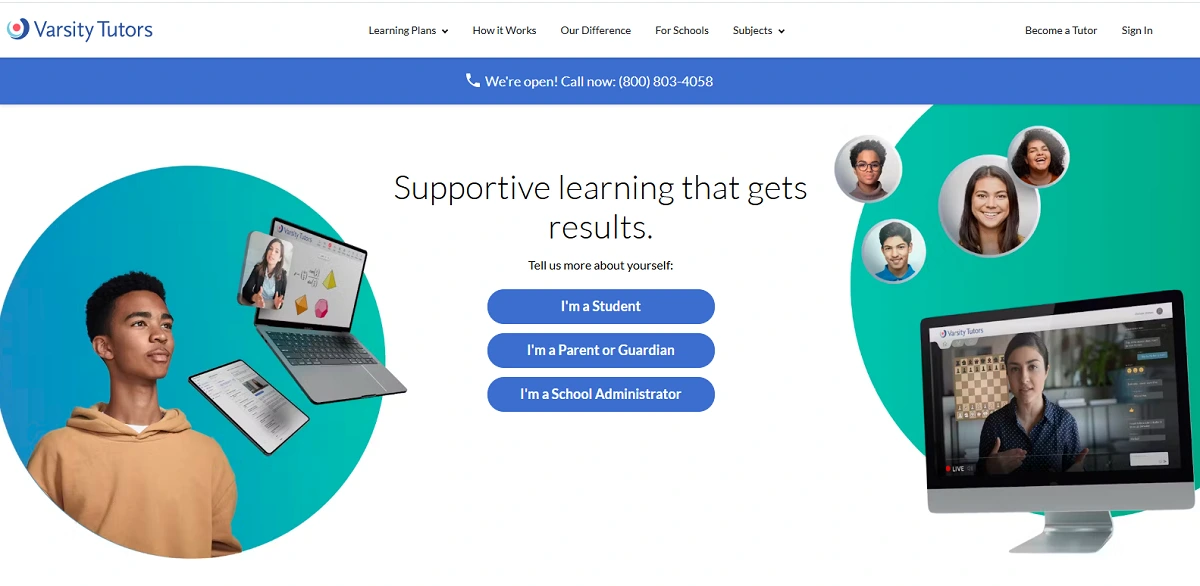
- Varsity Tutors: Varsity Tutors offers both one-on-one and small-group tutoring, including test prep and many subjects. Their tutoring rates are higher on average, often between $50 and $100 per hour, similar to or above Juni’s per-session cost. Varsity has a polished platform and even offers on-demand “instant help” in some cases. Like Juni, Varsity has a rigorous tutor selection (often professional teachers or grad students), but Juni focuses on near-peer college tutors specifically. Varsity’s advantage is its broad offerings (languages, college subjects, test prep, etc.) and mobile-friendly interface. Juni’s advantage is its personalized curriculum and progress tracking. Varsity is known for strong branding and has more public trust (it’s a large company), whereas Juni is a smaller startup feel. If budget is not a concern and you want many options (or group classes), Varsity can be good; if you want a set 1:1 curriculum for K-12 coding/math, Juni may be more suitable.
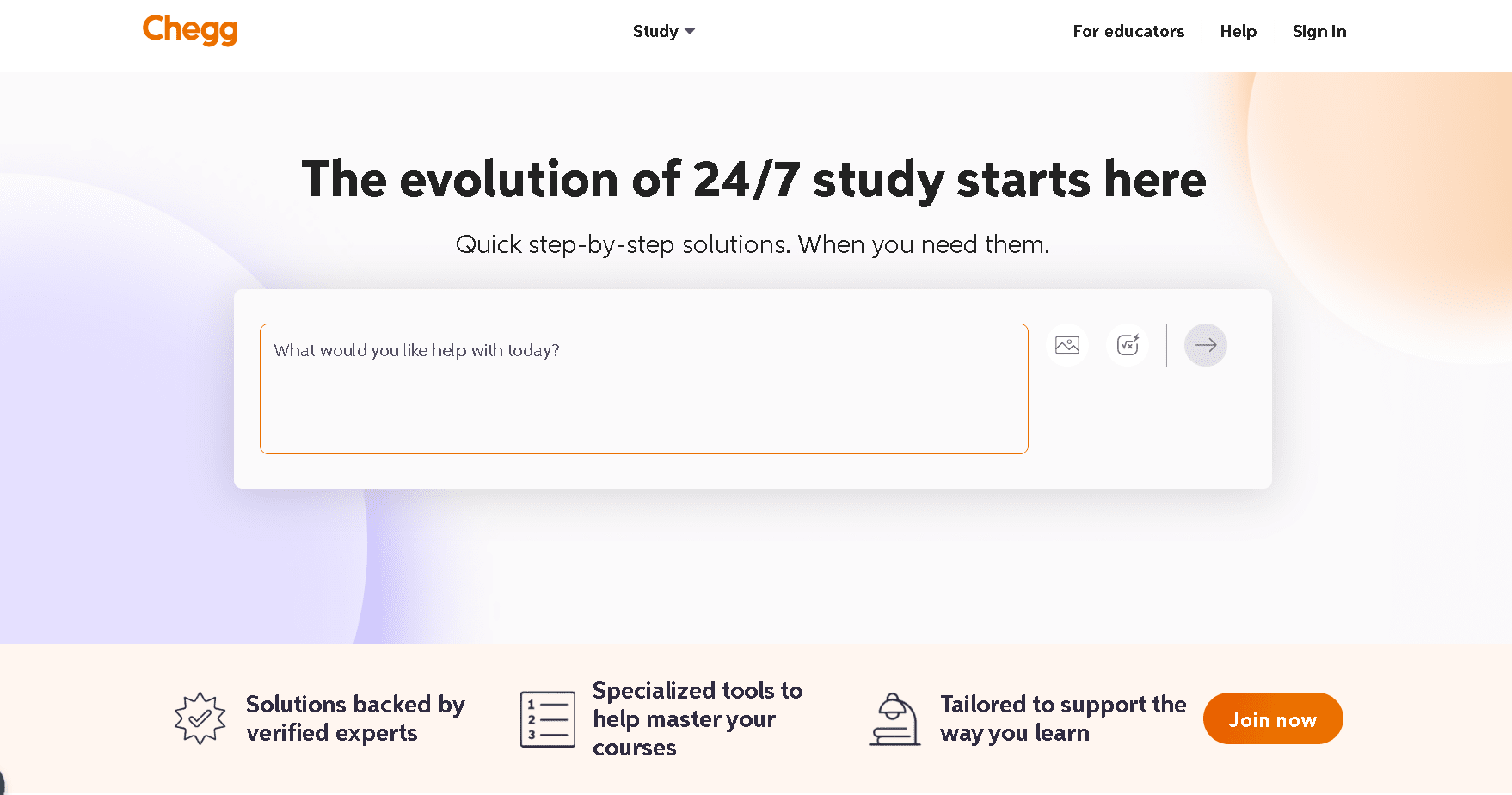
- Chegg Study: Chegg Study is a subscription service (around $15–$20/month) that provides homework Q&A, textbook solutions, and limited chat help from experts. Note: Chegg’s live tutoring service was discontinued in 2022, so now it’s mostly asynchronous help. Unlike Juni’s live weekly classes, Chegg answers questions on demand (you post a problem and wait for an expert’s solution). It is far cheaper than Juni’s one-on-one classes, but also less personalized. Chegg’s content is instant and covers many subjects, but it doesn’t give a structured lesson plan or progress reports. Chegg is better for occasional homework help or study questions, while Juni is for regular learning. Parents should note that Chegg’s quality depends on the experts who respond, which can be mixed. Juni’s tutoring is live and interactive, whereas Chegg is more of a help desk. In essence, Chegg is cheaper on a month-to-month basis but offers less direct teaching.

- Tutor.com: Tutor.com, now part of the Princeton Review, provides 24/7 homework help and tutoring in many subjects. It offers subscription plans (often college-subsidy-based or packages of hours) rather than per-hour purchases. Pricing varies widely, but typical rates might be $40–$60/hr depending on plan. Tutors are professionally screened. Tutor.com is geared more toward high school and college students (including many AP/college subjects) and is often free through libraries or colleges. Juni differs in that it uses a fixed monthly plan with K-12 curriculum. Tutor.com is strong in immediate help and wide subject coverage; Juni excels in continuity and curriculum alignment. (As a note, some may use Tutor.com via school programs rather than paying individually.)
How it Works?
For Students
To start with Juni, a student or parent signs up on Juni’s website and fills in their interests and goals. Juni typically gives each new student a free placement class to assess level and match them to the right instructor. After that, students receive one 1:1 class each week (each class is 50 minutes by default) – four classes per month. Classes take place online via Juni’s platform (a Zoom-based interface with a collaborative whiteboard). After each session, the tutor uploads detailed session notes on the student’s portal. Students can also upload projects or record short videos of their work to share. Outside of class, Juni usually provides 30–60 minutes of optional practice or homework (with hints/videos) to reinforce learning.
Scheduling is flexible: Juni’s portal allows parents to choose a recurring weekly time that fits their schedule. Classes can be rescheduled up to 24 hours in advance if needed. The platform has a calendar, so students see upcoming lessons. During class, students and tutors interact via video and use the whiteboard to draw diagrams or code collaboratively. After class, students often practice assigned problems to solidify the material. In short, Juni works by pairing each student with a vetted tutor for regular weekly lessons, supported by tools like session notes and optional homework to ensure steady progress.
For Tutors
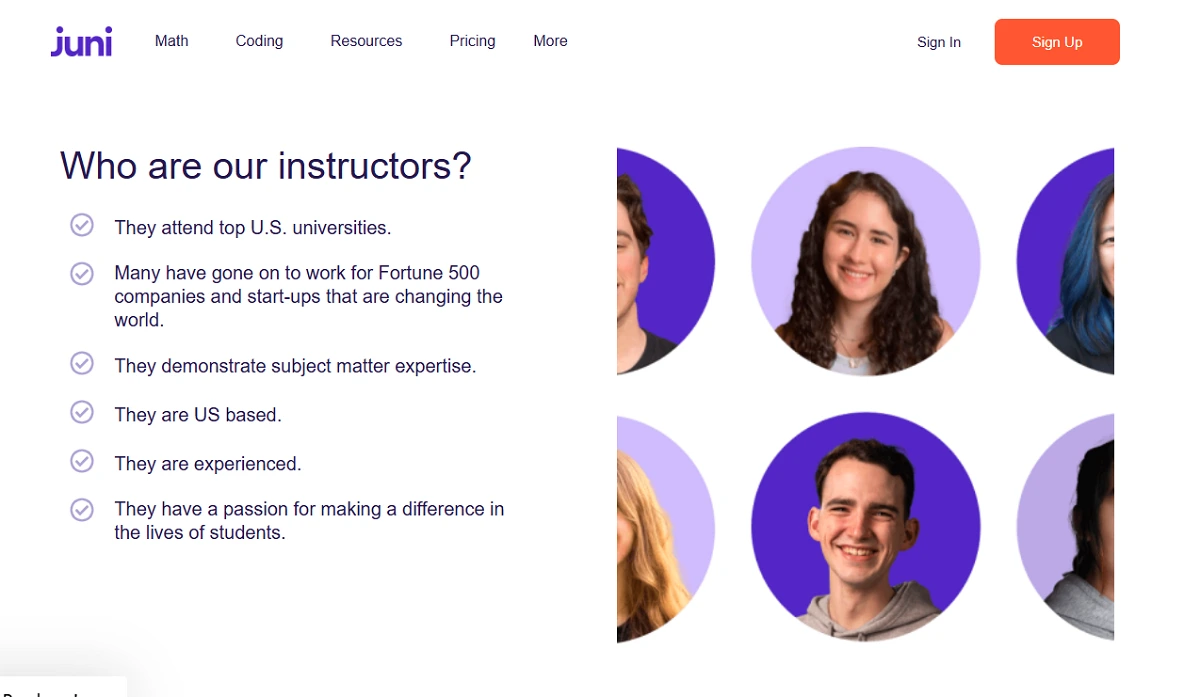
Tutors (called Instructors) at Juni must meet strict criteria: they must attend a top U.S. university, have strong subject expertise, relevant experience, and pass a background check. Juni hires only the top few percent of applicants (officially below 5% acceptance) through a rigorous screening process. Prospective tutors apply through Juni’s careers page (an Instructor Jobs link is provided on the site) and undergo interviews and training. Once hired, instructors are onboarded by Juni’s staff and partnered with a senior tutor for guidance before teaching their first class.
Juni instructors are paid hourly as W-2 employees, typically starting around $20 per hour (with potential raises up to ~$30/hr for full-time tutors). Tutors do not set their own rates; instead, Juni pays them a fixed wage. In practice, tutors say Juni makes it easy to get steady work: once approved, the platform schedules students to them, so they focus on teaching rather than finding clients. According to employee reviews, tutors appreciate the flexible hours (you can teach part-time around your own classes) and the structured support. Common advice for tutors is to be reliable and engaging, since Juni matches tutors based on fit. On the downside, some tutors note occasional frustrations: for example, they may get Slack messages about minor issues even when off-duty, and they often have to handle last-minute class changes by students. Overall, tutors report Juni is a decent gig for college students looking to teach; pay is moderate ($20/hr) and the scheduling is quite flexible, though the turnover of changing student needs can be a challenge.
Juni Learning: Company Information
Juni Learning was founded in 2017 and is headquartered in San Francisco. It was co-founded by Vivian Shen (CEO), a Stanford graduate and former product manager, who envisioned creating the educational opportunities she missed as a child. According to CEO Vivian Shen, Juni’s mission is “to provide students access to unique subjects and ignite a passion for learning”. In line with this, Juni offers award-winning proprietary curricula in coding, math, and related fields. Over the years, Juni has raised over $11 million in venture funding and delivered tens of thousands of classes (over 50,000 in a three-month period in 2020). They have also built an AI-powered SAT/ACT prep tool called Acely (formerly AceIt), and maintain partnerships to expand content.
USP of Juni Learning
- Expert tutors and mentorship: Juni hires instructors from top U.S. universities (admission rate <5%). These near-peer tutors are trained and vetted, and often share students’ interests, creating relatable mentorship. Juni also matches tutors to student interests so lessons feel customized.
- Structured, project-based curriculum: Juni’s courses are carefully designed with a progression from basics to advanced topics. The curriculum is project- and problem-based, so students actively solve real problems rather than just listen to lectures. For example, Juni now offers courses in advanced tech fields (cryptocurrency, robotics) and test prep, reflecting a forward-looking curriculum.
- Personalized learning and reports: After every class, Juni provides detailed notes and a progress report for parents. Many families value this feedback loop. Reviews note that Juni’s regular reports and updates keep parents informed and show how each child is improving. This level of communication is a selling point that many online tutoring platforms don’t emphasize.
- Tech-enabled platform: Juni offers an integrated online classroom with video chat, a collaborative whiteboard, and recording tools. Everything (classes, homework, notes) is in one user-friendly platform, as Juni advertises. This all-in-one approach and daily support make it easy to manage learning (e.g. all scheduling and content is in the portal, and support staff are available 7 days a week).
- Industry recognition: Juni has won awards (such as “Best Tutoring Solution” in 2021) and been featured in TechCrunch and other media. It has a strong user rating (around 4.8/5 on Trustpilot). These accolades reinforce Juni’s reputation for quality.
Drawbacks of Juni Learning
Despite its strengths, Juni Learning has some downsides based on user feedback and terms. First, the cost is relatively high: the monthly fee ($140-$450+) is above what many families pay elsewhere. Because it’s a subscription, you pay for all classes in advance; if you cancel mid-month there are no prorated refunds. Scheduling is strict: Juni requires 24-hour notice to reschedule and enforces a 90-day window to use make-up classes. So last-minute changes or absences can mean a missed paid session.
Juni’s focus is mostly on STEM and K–12 topics. If a student needs help in non-STEM areas (language arts beyond basic writing, humanities, etc.) or college-level subjects, Juni may not have those courses. Additionally, Juni’s tutors are all U.S.-based, which means content and style are American; international curricula or other languages are not offered. The platform also requires reliable tech: students need a decent computer with webcam, mic, and Zoom. Lastly, while most reviews are positive, a few did mention that some students progressed slower than hoped or found the teaching style too guided. In summary: Juni’s main drawbacks are its premium price, inflexible billing, and narrower subject range. Families should ensure those fit their needs before committing.
Comparison with My Engineering Buddy
Compared specifically to My Engineering Buddy (MEB), Juni’s strengths and weaknesses stand out. Juni provides a formal curriculum and consistent weekly classes, whereas MEB is more on-demand homework help. MEB often comes at a much lower cost: one user review praised MEB as “half the price” of local tutoring and offering better quality for complex subjects. Juni’s standard plan ($299) could be compared to MEB’s pay-per-assignment model, which for many homework problems can total far less. In terms of content, MEB tutors typically handle advanced college engineering and technical problems that Juni does not cover; Juni’s courses top out at high-school math, coding, and related areas. On the other hand, Juni has U.S. college tutors and a well-defined curriculum, which might give it an edge in structured learning. In short, MEB excels in low-cost, specialized engineering help, while Juni focuses on a broader K-12 STEM curriculum with project-based learning.
Customer Support and Policies
Juni offers customer support through email and an online portal, and advertises that its support team is available 7 days a week. Parents report that the support staff are generally friendly and responsive, helping with scheduling or questions. Juni’s policies (refunds, cancellations) are clear in the terms: no refunds for unused time and strict rescheduling rules. This transparency is good, but some parents have noted it limits flexibility if plans change.
For comparison, My Engineering Buddy uses WhatsApp for support, which can be very fast. In one review, a student said MEB’s customer service “replied almost immediately on WhatsApp”. This 24/7 chat approach can feel more instantaneous, whereas Juni’s support is more formal. Regarding refunds, Juni explicitly states that you cannot get prorated money back for a canceled month. MEB does not publish a formal refund policy on its site, so its practices are less clear, but some users assume better flexibility because they pay per problem. Overall, Juni’s support is solid but bound by its stated policies; MEB’s advantage is its quick chat-based help, while Juni’s advantage is its structured portal and documented terms.
Global Reach and Localization
Juni Learning is primarily U.S.-focused. Its tutors are based in the U.S. and its courses align with American K–12 standards. The platform operates in English, and there is no mention of multi-language support or local branches. Students outside the U.S. can use Juni, but must fit into U.S. time zones and pay in USD. In contrast, MEB appears more globally oriented through its online model: the site shows clients in North America and elsewhere using WhatsApp or email in various time zones. However, MEB also operates in English. Neither service offers dedicated localization for other languages. So for international users, Juni is simply used as an English-language platform, whereas MEB’s chat-based system is flexible but still English-centric.
Juni Learning’s Future Plans
Juni continues to expand its offerings, especially with new tech and AI elements. In 2023 they launched “AceIt” (now called Acely) – an AI-powered SAT/ACT prep tool that provides 24/7 practice questions in an interactive chat format. On the course side, Juni added a “Future Of” curriculum focused on trending fields (e.g. cryptocurrency, cybersecurity, climate science) for teens. They also introduced robotics courses in partnership with tech organization. These moves indicate Juni is investing in AI integration and keeping content up-to-date with industry trends. Press coverage and company blog posts suggest they will continue to roll out advanced STEM topics and possibly enhance their online platform with more AI-driven learning tools. While no specific global expansion was announced, Juni’s strategy clearly involves deepening its tech curriculum and leveraging AI to personalize learning.
FAQs About Juni Learning
How does Juni Learning compare to My Engineering Buddy? Juni offers scheduled 1:1 weekly classes with a set curriculum and progress tracking, while My Engineering Buddy provides on-demand assignment help. Juni’s tutors are U.S. university students and its pricing is subscription-based (~$299/mo for 4 classes), whereas MEB uses practicing engineers worldwide and usually charges per problem at lower total cost. Juni is strong for a structured STEM curriculum; MEB is strong for flexible, specialized engineering support.
How much does Juni Learning cost per month? As of 2025, Juni’s base plan is about $299 per month for weekly classes (4 classes/month). Other tiers range roughly from $140 up to $450 per month, depending on the number of lessons and services included. They bill in USD and require a monthly subscription (no pay-as-you-go per class).
Is Juni Learning worth the cost? Many parents find the cost justified by the quality of instructors and curriculum. Juni has high ratings (~4.7–4.8/5) and users often say kids enjoy and learn from it. If your child needs regular STEM tutoring and likes the idea of a structured program, many reviewers feel Juni delivers value. However, if your child only needs occasional help, you might compare it to cheaper alternatives. In general, Juni is seen as worth it for committed students because it combines personalized teaching with accountability (progress reports).
Do Juni tutors set their own rates? No. Juni instructors are paid a fixed hourly wage by Juni; they do not charge students individually. Juni tutors typically earn around $20/hour, as salaried employees or W-2 contractors. This is different from marketplaces like Wyzant, where tutors set their own prices.
How do I cancel my Juni subscription? You can cancel through your Juni account. The policy requires cancelling at least 3 business days before your next billing date to avoid the next charge. After cancellation, your subscription remains active through the end of that prepaid month. Note that per Juni’s terms, cancellations do not come with refunds for the remaining days, so plan to end your plan right before the monthly renewal.
What ages and subjects does Juni cover? Juni Learning serves students ages 7 to 18. It covers a range of STEM subjects: coding (beginner to advanced computer science), K–12 math (up to AP calculus), science (physics, chemistry, etc.), as well as courses in finance, entrepreneurship, communications (writing and speech), and test prep. It is aimed at school-aged children and teens, not adults or preschoolers. Juni often tailors classes to the child’s grade level and interests.
Is there a free trial for Juni Learning? Yes. Juni offers a 2-week free trial period for new students. During this trial, you can try actual Juni classes (often via a placement or introductory course) to decide if it fits your needs before paying. Take advantage of the trial to see if you and your child like the teaching style and platform.
Conclusion
In summary, Juni Learning is a high-quality online tutoring platform with many strengths: vetted instructors from top colleges, a structured project-based curriculum, and supportive features like progress reports. Its consistently high ratings suggest it effectively engages students in STEM subjects. The main drawbacks are the cost and subscription model (no prorated refunds) and a focus on U.S. curriculum areas. In terms of alternatives, My Engineering Buddy stands out as a more budget-friendly option, especially for college-level STEM help. When choosing between them, Juni is preferable for regular K–12 tutoring with ongoing support, while MEB may be a better value for specific engineering or homework tasks at a lower price. Ultimately, the decision should weigh Juni’s structured, comprehensive approach against MEB’s flexibility and cost savings.
******************************
This article provides general educational guidance only. It is NOT official exam policy, professional academic advice, or guaranteed results. Always verify information with your school, official exam boards (College Board, Cambridge, IB), or qualified professionals before making decisions. Read Full Policies & Disclaimer , Contact Us To Report An Error

